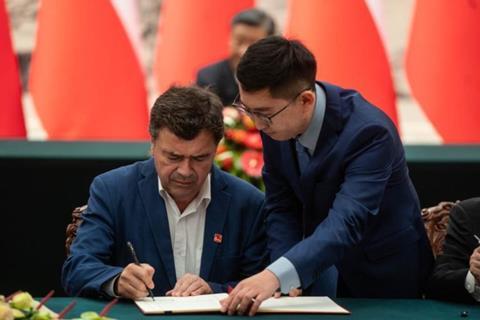Protocol signed after meeting between two presidents in Beijing, with exports expected to commence this season

Chilean fruit exporters are celebrating the news that China has opened its doors to their peaches and apricots after the signing of a protocol in Beijing on Tuesday (17 October).
The protocol formed one of a series of agriculture agreements signed by the two nations following a meeting between Chilean president Gabriel Boric and his Chinese counterpart Xi Jinping during Boric’s visit to China to attend the Belt and Road Forum.
Market access for peaches and apricots is expected to generate new opportunities for Chilean stonefruit producers and exporters given the strong demand for the category in China, according to a statement from the Chilean Ministry of Agriculture.
Chilean agriculture minister Eseteban Valenzuela hailed the new protocol, highlighting the benefits to particular growing regions where production of peaches and apricots is concentrated.
“We’re delighted that peaches from Central Chile and apricots, which are such an important crop in Valparaíso and the Coquimbo region, especially the province of Choapa, among other areas, will be part of Chilean fruit supply to China,” he said.
Asoex president Iván Marambio, who joined Boric’s delegation to China, also welcomed the new market access in a report on Simfruit.
“With the signing of this protocol, not only do our exports to this market grow, but Chile becomes the first country to have secured access for practically all our fruits to enter China,” said Marambio. “This highlights the strong relations between our two nations, and the significant work of our sector, together with Ministry of Agriculture and SAG (Agriculture and Livestock Service) to deliver high-quality and safe fruit to consumers.”
Before exports can commence, inspectors from China’s Animal and Plant Quarantine Department must conduct a technical visit to Chile to audit operations.
Chinese quarantine officials are scheduled to visit Chile in November, and exports will begin once the audit is approved, with the industry expecting to commence shipments this season.
Chile exported 270,000 tonnes of stonefruit in 2022, with plums making up the largest category by volume (59 per cent), followed by nectarines (31 per cent), peaches (10 per cent) and apricots (0.38 per cent). China was the main destination, taking 134,000 tonnes to account for some 50 per cent of total exports, followed by the US with 52,000 tonnes (19 per cent).
MoUs on agriculture cooperation
In addition to the protocol granting market access to Chilean peaches and apricots, the two nations signed three Memorandum of Understanding (MoU) agreements covering phytosanitary certification, organic food certification and the development of a Chinese demonstration farm in Chile.
The MoU on phytosanitary certification is focused on moving towards an electronic, paperless certification system for agricultural products, which is expected to modernise the export process, providing greater security and agility in bilateral trade.
The organic food certification MoU is designed to facilitate bilateral trade in organic produce where the organic certification standards of both countries are recognised.
The MoU for the development of a Chinese demonstration farm in Chile envisions the set-up of a Chinese-Chilean agrifood innovation and technology transfer centre that promotes sustainable agriculture.



